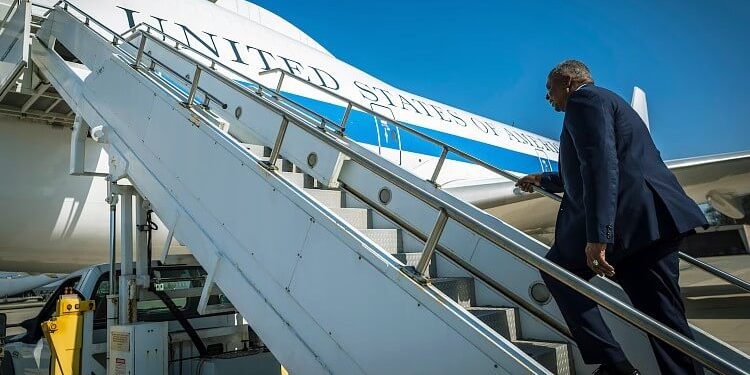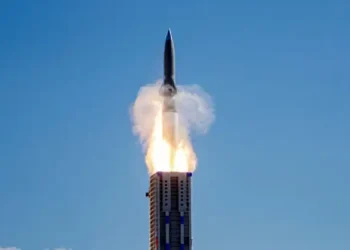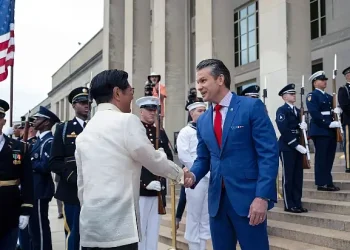On July 28, 2024, in Tokyo, the ROK-U.S. Defense Ministerial Meeting underscored the commitment of the United States and South Korea to bolster their alliance amidst rising security challenges.
This meeting, followed by a historic trilateral discussion with Japan, emphasized the need for unified responses to regional threats.
Reinforcing the ROK-U.S. Alliance
Minister of National Defense Shin Wonsik and U.S. Secretary of Defense Lloyd J. Austin III engaged in comprehensive discussions addressing critical security concerns on the Korean Peninsula and beyond. The talks centered on:
- Enhancing defense capabilities to deter and respond to threats from North Korea (DPRK).
- Expanding the scope of cooperation under the Nuclear Consultative Group (NCG) to strengthen nuclear deterrence.
The officials condemned the DPRK’s provocative actions, including recent balloon launches violating the Korean Armistice Agreement. They stressed the importance of maintaining a robust combined defense posture to safeguard regional stability.
Addressing Regional Security Concerns
A key highlight of the meetings was the dialogue on Russian-DPRK military cooperation. The leaders expressed grave concerns about illegal arms transfers and technological exchanges, highlighting these actions as violations of United Nations Security Council resolutions.
The commitment to enforcing sanctions and collaborating with the international community was reaffirmed, with both countries underscoring the necessity of these measures for maintaining peace and security.
To further enhance their partnership, the U.S. and South Korea agreed to modernize their defense capabilities, evolving into a technology-driven alliance. This strategic shift aims to foster innovation and ensure the two nations can effectively counter emerging threats.
Trilateral Cooperation with Japan
The first-ever Trilateral Ministerial Meeting in Japan marked a significant step forward in strengthening ties between the U.S., Japan, and South Korea. Defense leaders from these nations discussed shared regional concerns, focusing on:
- Strengthening trilateral security cooperation to deter nuclear and missile threats.
- Enhancing interoperability through joint military exercises and defense exchanges.
The leaders also addressed the growing concerns over North Korea’s aggressive missile tests and Russia’s deepening ties with the DPRK.
In response, the defense ministers signed the Memorandum of Cooperation on the Trilateral Security Cooperation Framework (TSCF), institutionalizing their security cooperation. This agreement formalizes senior-level consultations, information sharing, and coordinated responses to regional challenges.
Main Discussion Areas Covered in the Trilateral Meeting:
- Opposition to any unilateral actions in the Indo-Pacific that threaten stability.
- A pledge to uphold international law, particularly regarding maritime and air activities.
The trilateral exercise “Freedom Edge,” conducted in late June 2024, demonstrated the enhanced coordination and readiness of these three nations to address common security threats.
This exercise, along with the newly signed agreements, signifies a new era of collaboration aimed at ensuring peace and stability in the Indo-Pacific region.
The Way Ahead
As the ROK-U.S. alliance celebrates its 70th anniversary, the commitment to peace and security remains unwavering. The recent meetings and agreements highlight the shared resolve to confront challenges head-on.
The U.S., South Korea, and Japan are not only reinforcing their defense postures but also setting a precedent for international cooperation in addressing global security issues.
Future Prospects:
- Continued enhancement of defense industrial cooperation.
- Increased engagement with the United Nations Command and other regional partners.
The next Trilateral Ministerial Meeting, scheduled for 2025 in South Korea, will further consolidate these efforts, showcasing a unified stance against threats to regional and global stability.
To Conclusion
The recent ROK-U.S. and trilateral meetings with Japan have set a robust foundation for future cooperation. These gatherings not only addressed immediate security concerns but also laid out a strategic vision for a secure and stable Indo-Pacific region.
As these alliances strengthen, they serve as a beacon of stability in an increasingly complex global landscape.
Sources: THX News, CSIS, Bloomberg, America’s Navy & US Department of Defense.









